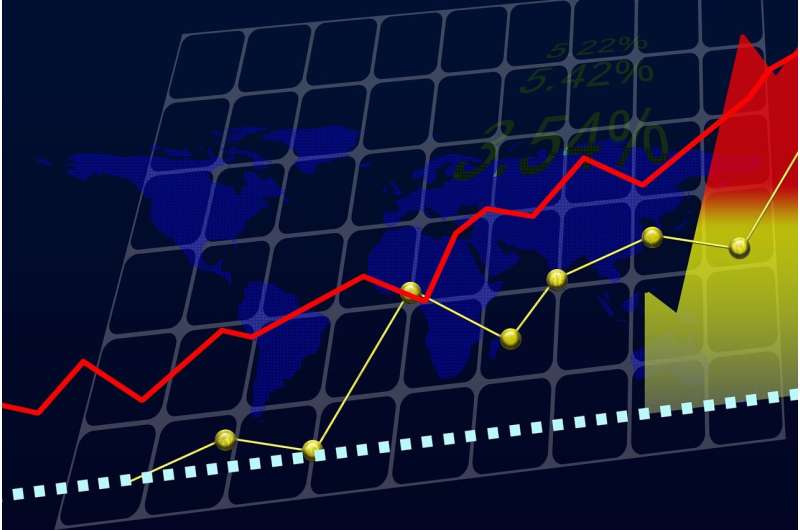This article has been reviewed according to Science X's editorial process and policies. Editors have highlighted the following attributes while ensuring the content's credibility:
fact-checked
peer-reviewed publication
trusted source
proofread
Ukraine energy crisis may push millions into extreme poverty

Soaring energy prices triggered by the Russia-Ukraine conflict could push up to 141 million more people around the globe into extreme poverty, a new study reveals.
Households' energy costs for heating, cooling, and mobility have risen sharply, while rising energy prices have pushed up the costs of goods and services.
Experts predict households' energy costs are likely to rise by 62.6%–112.9%, contributing to a 2.7%–4.8% hike in household expenditure and cost-of-living pressures that could push between 78 million and 141 million people into extreme poverty.
An international group of scientists—including experts from the Universities of Birmingham, Groningen and Maryland, as well as the Chinese Academy of Sciences—modeled the impact of rising prices on households in 116 countries.
Publishing their findings today (Feb. 16) in Nature Energy, the researchers call for targeted energy assistance to help vulnerable households during the current crisis—emphasizing that many people will need support to afford necessities, especially food.
One of the corresponding authors Yuli Shan, from the University of Birmingham, commented, "High energy prices hit household finances in two ways. Fuel price rises directly increase household energy bills, while energy inputs needed to produce goods and services push prices up for those products as well and especially for food, which affects housholds indirectly.
"Due to the unequal distribution of income, surging energy prices will affect households in very different ways. Unaffordable costs of energy and other necessities will push vulnerable populations into energy poverty and even extreme poverty.
"This unprecedented global energy crisis reminds us that an energy system highly reliant on fossil fuels perpetuates energy security risks, as well as accelerating climate change."
Researchers calculated the change in energy cost burden rates—additional energy costs in household total expenditure compared to pre-crisis levels. They found significant variation across and within different countries, determined by household consumption patterns and the fossil fuel dependency of global supply chains.
The experts found that wealthier households tend to have heavier burden rates of energy costs in low-income countries, whereas poorer households tend to have higher rates in high-income countries. Households in Sub-Saharan African countries are hardest hit in terms of total energy cost burden rate.
Globally, wealthier groups tend to have higher energy costs on goods and services with high value-added, while poorer households tend to spend more on meeting daily needs such as food and direct energy.
The other corresponding author Klaus Hubacek, from the University of Groningen, commented, "Understanding how global energy prices are transmitted to households through global supply chains and who is more affected is crucial for effective and equitable policy design.
"This crisis is worsening energy poverty and extreme poverty worldwide. For poor countries, living costs undermine their hard-won gains in energy access and poverty alleviation. Ensuring access to affordable energy and other necessities is a priority for those countries, but short-term policies addressing the cost-of-living crisis must align with climate mitigation goals and other long-term sustainable development commitments."
Since late February 2022, the Russia-Ukraine conflict has caused energy markets to experience a huge shock. Global energy prices have surged because of a variety of factors including the ongoing conflict, a rapid global post-pandemic economic recovery, high reliance on fossil fuels, and a severe mismatch between energy demand and supply.
Russia is a major exporter of oil and natural gas meaning that countries reliant on oil and natural gas imports from Russia face unprecedented fuel supply shortages. At the same time, emerging economies are suffering from high fuel import costs and fuel deprivation.
A global cost-of-living crisis has pushed a number of economies into recession, sparked higher inflation, and put painful cost-of-living pressures on households around the world.
More information: Yuli Shan, Burden of the global energy price crisis on households, Nature Energy (2023). DOI: 10.1038/s41560-023-01209-8. www.nature.com/articles/s41560-023-01209-8
Journal information: Nature Energy
Provided by University of Birmingham





















